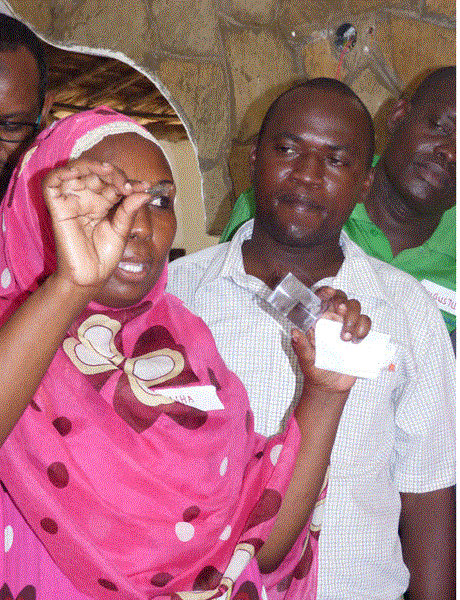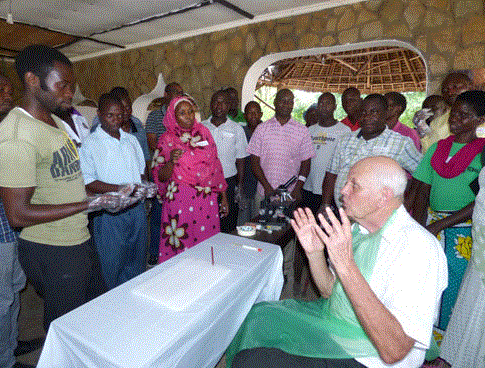A One-Day Workshop on the Health and Welfare of Invertebrates, particularly butterflies, was held at Kipepeo, situated at Gedi Historical Site, a village near the coastal town of Malindi in Kenya, on Wednesday 21st February 2018. The Kipepeo Project involves communities who live on the margins of the Arabuko-Sokoke Forest. Local people rear butterflies of certain species, using eggs from females that have been collected in the forest.

Group photo at end of workshop
Participants on the Kipepeo Workshop in Kenya, with their tutors - Hussein Aden, Laban
Njoroge, Margaret and John Cooper
The Kipepeo Project at Gedi then packs these as pupae and sends them to butterfly houses in Europe and North America. This arrangement not only assists local people to earn an income but also provides an incentive for them to protect the Arabuko-Sokoke Forest and its various endemic and endangered species of fauna and flora.
The Workshop in February was organised under the auspices of the National Museums of Kenya (NMK) and was run under the direction of the staff of Kipepeo and Mombasa Butterfly House (MBH). The tutors and demonstrators were Mr Hussein Aden, Mr Laban Njoroge, Professor John E Cooper and Mrs Margaret E Cooper. This intensive training day was primarily intended for the staff of Kipepeo and the Mombasa Butterfly House but it also attracted some others who work with Invertebrates or have an interest in their care in captivity and their conservation in the wild. These included two Kenyan registered veterinary surgeons involved in the licensing of animals and animal products. A total of 41 people participated in the day's activities, including 25 involved locally in the "farming/breeding" of butterflies.
In his opening remarks, Hussein Aden gave a welcome to Kipepeo and the workshop. John and Margaret Cooper then led the preliminary session, in which the hosts, tutors and registrants introduced themselves. Amongst those welcomed as guests were Dr Ian Gordon, now resident in Rwanda, who had started the Kipepeo Project in 1993. He outlined its history, aims and achievements to date. Another invited guest was Mr Mike Clifton, a very experienced entomologist who has lived and worked in Kenya for many years.

A local lady registrant demonstrates handling and examination of an insect
The bulk of the morning consisted of lectures, delivered in a mixture of English and Swahili. The topics covered were "Introduction to invertebrates "(Laban Njoroge), "Legal and ethical aspects of keeping invertebrates in captivity" (Margaret E Cooper), "Invertebrate health" (John E Cooper), and a description of the work of Kipepeo and the Mombasa Butterfly House (Hussein Aden). The last of these was combined with an opportunity for the farmers/breeders to discuss their work and problems they encounter in respect of butterfly health.

John Cooper explains the principles of dissection in diagnostic work
The afternoon comprised practical work. Participants looked at live butterflies and viewed enclosures under the guidance of Hussein Adenand other Kipepeo staff and with input from Ian Gordon and Mike Clifton. This tour of the facilities was followed by a "hands-on" session in which Laban Njoroge and John Cooper demonstrated the gross examination of different stages of Lepidoptera and taught methods of dissection and investigation - including the taking of samples from butterflies for microscopy. Portable field equipment was used for this work, to illustrate how such procedures do not initially depend on sophisticated laboratory facilities.
The day finished with a discussion period, after which a group photo was taken (see above) and certificates were presented by Margaret Cooper to all registrants and those who assisted in the organisation.
This workshop at Kipepeo appears to have been a success. Much was learned by all parties. It was almost certainly the first time in Kenya, probably in Africa, that such a workshop, discussing the health of butterflies and linking this with welfare, conservation and sustainable use, had taken place. Discussions are underway as to how what was achieved in February could be developed and enhanced, not only so that it might directly benefit the work of Kipepeo and the Mombasa Butterfly House but with a view to its contributions to the scope of Kenyan entomology and the promotion of the country’s ecosystem health. One proposal is to organise a more in-depth, scientific, training session on invertebrate health and diseases in Nairobi, probably in the Entomology Section of the National Museums of Kenya. Further information about this and other possibilities will be announced in due course.
We are grateful to the Zoological Society of London (ZSL), the Veterinary Invertebrate Society (VIS), Dr John Ballany, Vetark Professional, Mr Paul Pearce-Kelly, Ms Sarah Pellett, Ms Sally Dowsett and Mrs Jeannie Knocker for their support and encouragement and to the Director-General of the National Museums of Kenya, Dr Mzalendo Kibunjia, for authorising the workshop.
An expanded version of this report on the 2018 Kipepeo Workshop, with images, will be issued soon.
John and Margaret Cooper. Wildlife Health Services (UK) ngagi2@gmail.com
Written by the Coopers.


